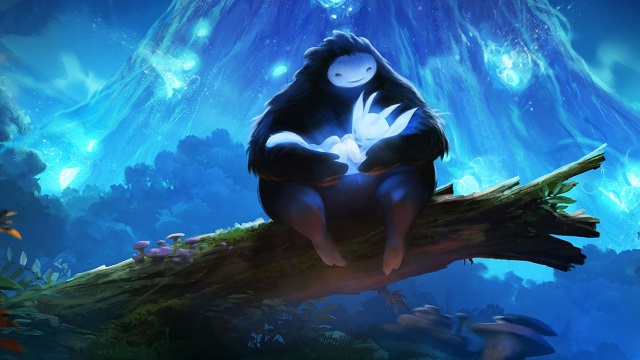
These days, it won’t take you long to stumble upon a new Metroid-inspired game. Seriously, they’re everywhere. As a result, not too many of them actually stand out or move away from the standard formula in any remarkable ways. Enter Ori and the Blind Forest, a 2D action-platformer in the same vein as Metroid and its various counterparts. It doesn’t break the mold completely, but it manages to prove you don’t need to in order to create something truly special.
Ori’s story isn’t particularly deep, but in many ways its simplicity adds to its emotional resonance. Talking specifics about the plot details of Ori wouldn’t tell you much about what makes its narrative, specifically in the opening ten minutes of the game, so special. In short, it handles tragedy in a surprisingly nuanced and mature way, immediately connecting you with the world and central character with some gorgeous visuals and a small sampling of narration. I wish more games could bring me into their world the same way Ori does.
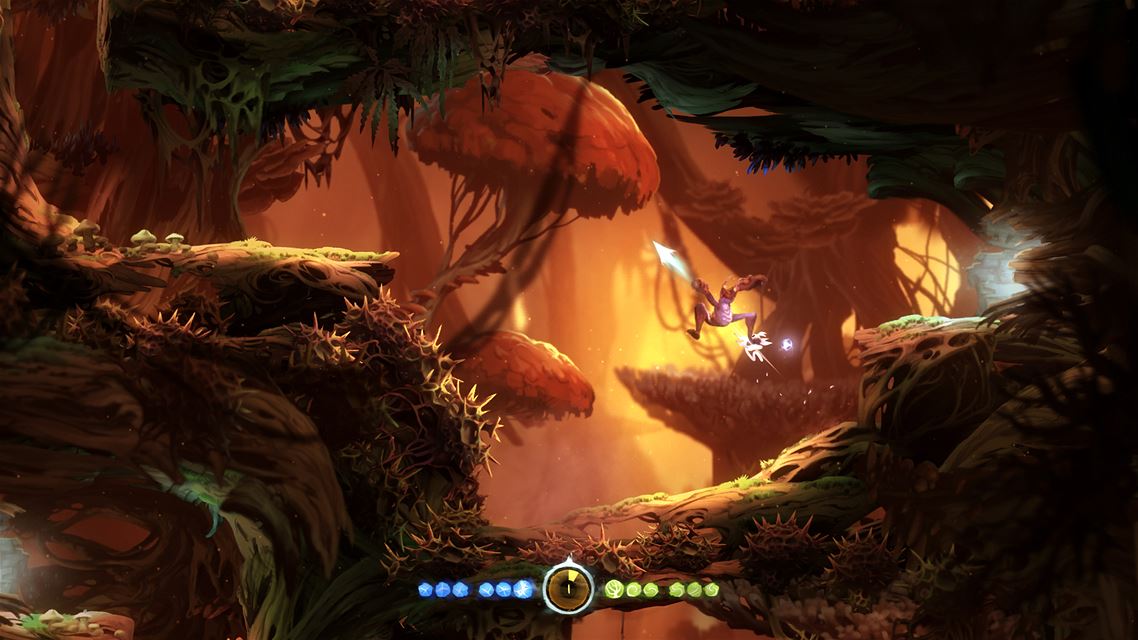
Choices in leveling
There are two basic upgrade methods in Ori: new traversal moves gained through plot-locked events, and quality of life improvements earned by spending experience points. Exploration remains gated off until specific moments are reached, but the choices between doing more damage and seeing collectible items on my map add a layer of nuance that really made me think before investing. – Ryan Dunn
Despite the emotional gut-punch you receive from the game’s prologue, there is plenty of fantastical whimsy to be had. As I mentioned briefly, Ori is visually stunning, complete with a coherent art style practically dripping with color and life. Although many people have no doubt played games with similar painted aesthetics, Ori brings it to a whole new level. Complete with a score that draws you into the mysterious world you now inhabit, it teases you with details and draws you closer to new and incredible wonders at every opportunity. In short, the game’s presentation speaks for itself.
A gorgeous game is one thing, but it means very little if the core gameplay doesn’t live up to it. Thankfully, Ori delivers on all fronts. Like any good platformer, the controls feel tight and precise. You immediately feel at fault for any mistimed jump and sudden death, as you never once feel like you lose control over your character. Even if the game were more of a basic platformer and not heavily inspired by Metroid, it would still be remarkable, simply due to just how great the basic act of controlling your character feels.
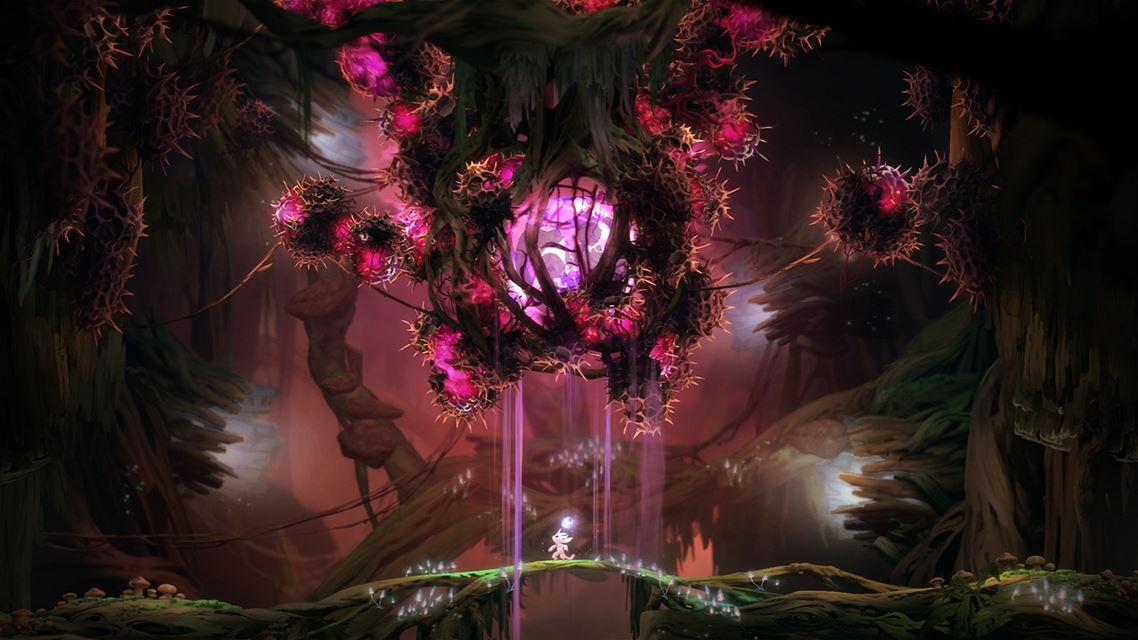
Platforming and combat
Ori‘s platforming segments almost reach a Super Meat Boy level of nirvana when firing on all cylinders. The most frustrating parts of Ori lie in its combat, as it just isn’t precise or tight enough to allow for the frenetic fights the game seems to sometimes want. Your main attack in Ori automatically locks on to the nearest foe, and this feels sloppy in more hectic sections and maddening in calmer ones. Luckily, Ori relies much more on its superior platforming, even making boss battles require more jumping and moving than shooting. – Ryan Dunn
As the game progresses, death becomes the most common enemy you face due to the game’s steady difficulty ramp. There’s no getting around it: Ori and the Blind Forest is a difficult game, but it never once feels unfair. Its the kind of challenge which leads to a rewarding feeling of accomplishment, never punishing the player, only expecting them to play by its rules. But as the challenges became more devious and the enemies more ruthless, I only felt more determined to progress. It never hindered, only helped and was ultimately more satisfying as a result.
As you might expect, you’ll come across many areas you can’t access while progressing the game due to the lack of certain abilities. As you gain those abilities, you’ll be able to run back through areas and find any secrets or other such goodies you might have missed originally. This is all particularly standard, but Ori’s world feels much larger and more varied than your average Metroid-inspired platformer. While the enemy variations might feel lacking, the actual environments and the new challenges each present feel different from the last. And with each new ability comes a new set of challenges, each better than the last.
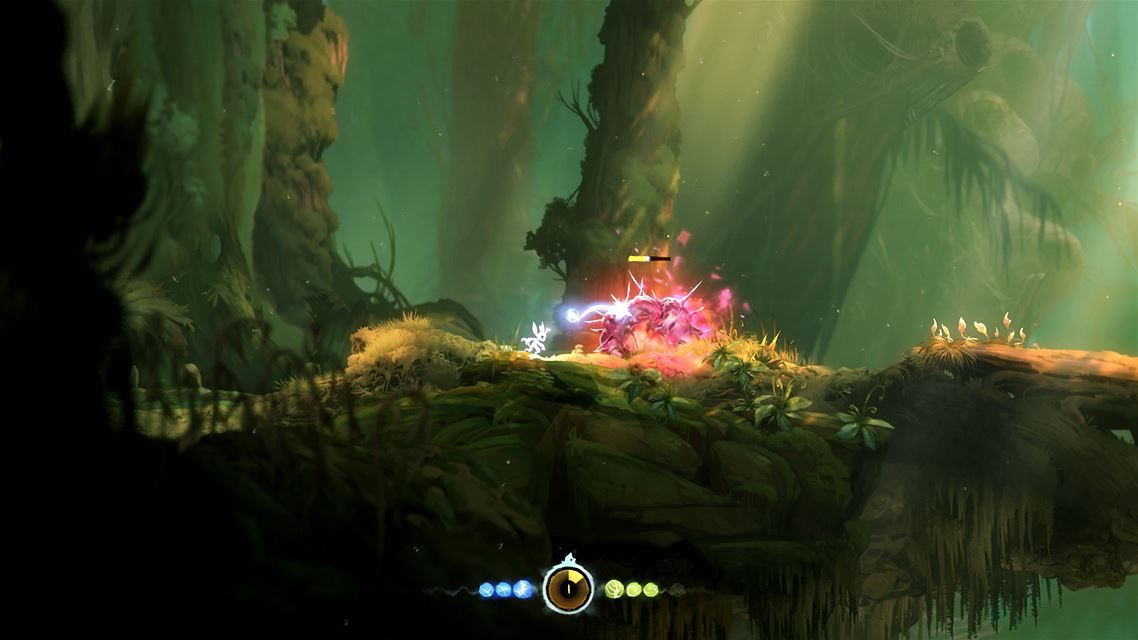
Trial by fire
Underneath the cute (and stunning) visuals of Ori does indeed lie an at times ferociously difficult game. This difficulty is tempered by its checkpoint scheme, but expect some frustration learning exactly how to manipulate the system to your advantage. It requires a different way of thinking, but once the growing pains are through it strikes an amazing balance of difficulty and fairness. – Ryan Dunn
My favorite ability quickly became the “bash attack,” which lets you bounce off of enemies and projectiles to reach higher grounds. Some of the game’s best early moments involve bouncing from specifically placed points, enemies and the projectiles the enemies shoot all while avoiding falling into a large pit of spikes. On top of that, you can use this ability to knock projectiles towards other enemies or use them to break open walls to gain access to hidden goodies. The game was still a blast to play prior to unlocking this ability, but this, alongside gaining the ability to double-jump, increased the challenge and variety of platforming puzzles. It was, in essence, where the true Ori and the Blind Forest began.
Checkpoints are often a source of frustration for many in difficult games like this. Ori’s approach is smart and unlike anything I’ve seen before. Outside of a few automatic checkpoints, the placement of them (known as Soul Links) are entirely determined by the player. At any point, you can place a checkpoint (which doubles as a save point) and restart there with every death. You can’t place these on unstable ground and how many you place are determined by your energy meter, but this puts the onus on the player for any long stretches of gameplay with no checkpoints. It’s a brilliant system which forces the player to rethink how they approach each new challenge as well as how to balance the frequency of checkpoints placed and how much energy you have left to place them.
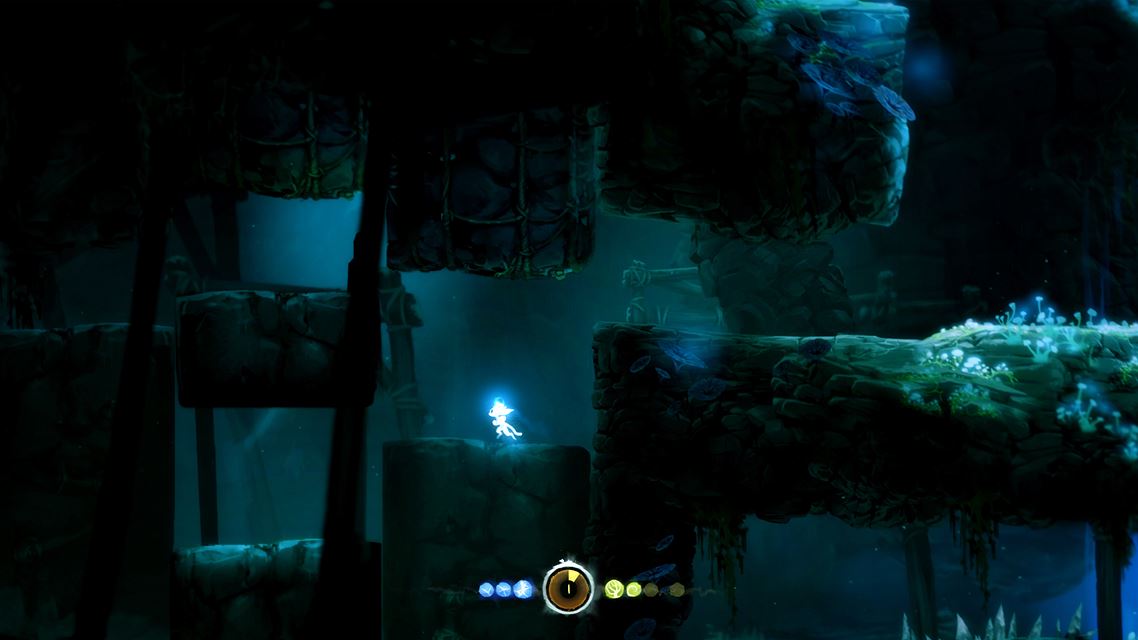
Despite the numerous number of similar games released in the past five or so years, very few stand out the same way Ori and the Blind Forest does. It’s a refreshingly challenging, gorgeous, emotionally resonant title that does everything you expect from the genre and then some. It may not break much new ground, but never once ceased to amaze me in terms of its immense scope, satisfying gameplay and undeniably memorable presentation. This is a game we’ll be talking about among the likes of Super Metroid and Castlevania: Symphony of the Night for many years to come.
Pros: Emotionally resonant story, incredible visuals, precise controls, refreshingly challenging, brilliant checkpoint system
Cons: Weak combat



















